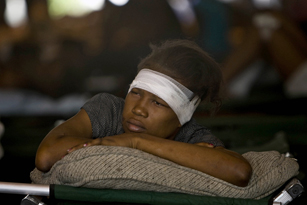WELCOME TO THE ARCHIVE (1994-2014) OF THE MAQUILA SOLIDARITY NETWORK. For current information on our ongoing work on the living wage, women's labour rights, freedom of association, corporate accountability and Bangladesh fire and safety, please visit our new website, launched in October, 2015: www.maquilasolidarity.org
April 6, 2010
Many feared that the earthquake would cripple Haiti's garment industry, the country's largest formal, private sector employer and largest source of export income, leaving thousands of workers unemployed. However, early reports from the ground indicated that relatively little damage was done to garment manufacturing facilities.
All but five of the country's 28 garment factories escaped with relatively minor damage, and many factories were back in operation by early February. The most tragic exception was the collapse of the Palm Apparel factory that killed an estimated 500 workers. One of Palm Apparel's main customers was Canadian T-shirt manufacturer Gildan Activewear.

Although Haiti's garment industry survived the earthquake relatively unscathed, garment workers did not. "In the aftermath of the earthquake, many apparel workers have migrated to the countryside or are unaccounted for," said a February 9 report from the Worker Rights Consortium (WRC). "And, of those who have returned to work, many have lost relatives and remain homeless, without adequate food for themselves and their families."
In response to this emergency situation, the Maquila Solidarity Network (MSN) joined with the WRC, the International Textile, Garment and Leather Workers Federation, and the AFL-CIO Solidarity Center in putting forward a series of recommendations to garment companies producing in or sourcing from Haiti. These have been the focus of conversations with several brands and the ILO Better Works program which was in the midst of preparing for the launch of a Better Works initiative in Haiti prior to the quake.
The recommendations included a call to set up humanitarian relief programs to be carried out through apparel factories, some of which are among the few large institutions still functioning after the earthquake, to provide displaced workers with severance pay and outstanding wages, and to offer compensation and assistance to earthquake victims or their families.
Companies were also urged to carry out safety inspections of supplier factory structures to prevent further danger to workers, and to keep production in Haiti either by shifting it from damaged facilities to those that were not damaged or by building new factories to replace damaged ones.
Given the history of labour rights abuses in Haiti's apparel industry, MSN and our partners also urged apparel companies to work with stakeholders to establish decent working conditions in their supplier factories, including by providing "orders at volumes, prices and delivery dates that will enable these factories to operate and provide decent work to employees during the recovery process."
To their credit, two of the major apparel manufacturers sourcing from Haiti, Gildan Activewear and Hanesbrands, did respond quickly to the crisis. In addition to contributing to special emergency relief funds, both are providing workers food baskets and temporary shelter (tents) through their suppliers. Gildan is also working with the owner of Palm Apparel to provide special assistance to disabled workers and to families of workers who lost their lives.
With the arrival of the rainy season, more assistance is desperately needed to ensure that Haitian garment workers who continue to suffer as a result of the earthquake receive adequate emergency assistance, full financial compensation owing, and employment under decent working conditions.